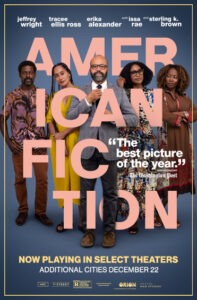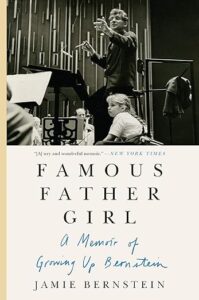 Let me start by saying that my favorite film this year is American Fiction, directed and written by Cord Jefferson with a smart, funny screenplay. Jeffrey Wright plays a “normal” Black man: a college professor and author who has to deal with love issues, irascible academics, prickly siblings, a sick mother who needs help in her old age like any other mortal of any race. Don’t go looking for gangsters, impoverished adolescents in the ghetto or drug addicts. Well, only some drugs.
Let me start by saying that my favorite film this year is American Fiction, directed and written by Cord Jefferson with a smart, funny screenplay. Jeffrey Wright plays a “normal” Black man: a college professor and author who has to deal with love issues, irascible academics, prickly siblings, a sick mother who needs help in her old age like any other mortal of any race. Don’t go looking for gangsters, impoverished adolescents in the ghetto or drug addicts. Well, only some drugs.
However, it seems that most American films currently on the screen are non-fiction, based on biographies of famous people, successful memoirs or both. Take Scorsese’s Killers of the Flower Moon, with luminaires like Leonardo DiCaprio, Robert De Niro and newly winner of a Golden Globe, Lily Gladstone. The story of the Osage murders in the 1920’s is worth this three-and-a-half hours feature based on David Grann’s non-fiction book of 2017 of the same title. Likewise, Oppenheimer, another three hours saga, portrays the father of the atomic bomb already portrayed in American Prometheus: The Triumph and Tragedy of J. Robert Oppenheimer the book by Kai Bird and Martin J. Sherwin. While Ferrari is based on the 1991 biography of Enzo Ferrari, The Man, the Cars, the Races, the Machine by Brock Yates, with Adam Driver as the driver (pun intended).
The Boys in the Boat, directed by George Clooney about the 1936 Olympics is inspired by Daniel James Brown’s number 1 best-selling non-fiction book of 2013. Similarly, Nyad with amazing performances by Annette Bening in the title role and Jodie Foster as her trainer, tell us the story of Diana Nyad based on the memoir of Nyad herself, Find a Way of 2015. Funny how this feel-good movie made me cry like no other of much more epic impact. Even musicals like The Color Purple and Mean Girls can be linked to their written roots: Alice Walker Pulitzer winning novel of 1983 and Tina Fey’s screenplay respectively.
Foreign films also seem to follow this non-fictional trend. The unsettling The Zone of Interest about the Auschwitz concentration camp and its peaceful neighbors is loosely based on the 2014 book of the same title by Martin Amis. The Spanish film Society of the Snow, directed by J. A. Bayona is another case in point, with the aggravating circumstance that it was already made into a movie before, Alive in 1993, based on Paul Read’s book of the same title once more. One has to ponder why tell the same story again. This time the actors are Uruguayan and Argentinian instead of American actors like Ethan Hawke impersonating the Latin American rugby players whose airplane crashed on the Andes. Aside from the technical finesse, a redeeming quality in Society of the Snow consist of the unexpected caring masculinity and cooperation of the men trapped together atop the snow-covered mountain.
I’m leaving the best example for last. Maestro, directed, written and acted by an astounding Bradley Cooper, tells us the intimate story of Leonard Bernstein from the day he gets the call to perform in Carnegie Hall to the aftermath of his wife’s illness. Felicia Montealegre, in a nuanced performance by Carey Mulligan, is as much a protagonist as her husband. There are a few scenes of the couple with their three children, but not enough to see them as real-life characters within their family.
Cooper, tells us the intimate story of Leonard Bernstein from the day he gets the call to perform in Carnegie Hall to the aftermath of his wife’s illness. Felicia Montealegre, in a nuanced performance by Carey Mulligan, is as much a protagonist as her husband. There are a few scenes of the couple with their three children, but not enough to see them as real-life characters within their family.
 However, the oldest daughter, Jamie Bernstein, wrote a memoir in 2018 with the provocative title of Famous Father Girl. A Memoir of Growing Up Bernstein, on which the film is loosely based. Just like with any film based on a literary work, comparisons ensue. If the film is an intimate portrayal of the music genius, the book is even more and then some. Something I would have loved to see on the screen is that the Bernstein family was bilingual, given Felicia’s Latin American roots. In fact, the maids referred to Leonard as niñito, which could be translated as little spoiled child. Jamie’s memoir is peppered with meaningful Spanish words like this one. As in the film, the question of Bernstein’s homosexuality is a big secret to be kept from the children.
However, the oldest daughter, Jamie Bernstein, wrote a memoir in 2018 with the provocative title of Famous Father Girl. A Memoir of Growing Up Bernstein, on which the film is loosely based. Just like with any film based on a literary work, comparisons ensue. If the film is an intimate portrayal of the music genius, the book is even more and then some. Something I would have loved to see on the screen is that the Bernstein family was bilingual, given Felicia’s Latin American roots. In fact, the maids referred to Leonard as niñito, which could be translated as little spoiled child. Jamie’s memoir is peppered with meaningful Spanish words like this one. As in the film, the question of Bernstein’s homosexuality is a big secret to be kept from the children.
I wouldn’t want to suggest that my father’s notoriety was as far reaching as Bernstein, but I too have struggled with “being the daughter of.” Famous Father Girl validates my feelings, showing how someone else has navigated similar family situations. I have to admit that my favorite genre, for a long time now, is non-fiction.

Hi Concha,
I can see that all is well with you, Great!
All well here too.
Let’s do lunch in Philly some time.
Cheers! Jane X
Sounds great, Jane!
XO, Concha
Hi Concha,
By the way, I enjoyed your blog. I will be sure to see American Fiction. It is interesting that the films you mentioned are all based on biographies of famous people, mostly men of course with notable exceptions such as the Nyad film. I haven’t seen any of them except Maestro. The book sounds like it would be good reading. Ramona
Many thanks for your kind words and for suggesting Obit, great documentary!
Concha
I’m with you on most of your movie comments though I haven’t seen them all. J
So many good films around and we still can walk to most of them!
Concha
Thanks for this week’s blog – It pushed us to go see American Fiction – loved it!
Just saw that it has several Oscar nominations! Concha